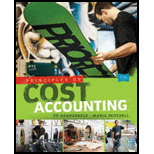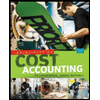
Principles of Cost Accounting
17th Edition
ISBN: 9781305087408
Author: Edward J. Vanderbeck, Maria R. Mitchell
Publisher: Cengage Learning
expand_more
expand_more
format_list_bulleted
Concept explainers
Question
Chapter 2, Problem 10P
1.
To determine
Journalize the transactions and provide impact of each transaction in a table format.
2.
To determine
Compute the material inventory balance and the cost of material used in production.
Expert Solution & Answer
Want to see the full answer?
Check out a sample textbook solution
Students have asked these similar questions
None
What is the value of the company's total assets?
General accounting
Chapter 2 Solutions
Principles of Cost Accounting
Ch. 2 - What are the two major objectives of materials...Ch. 2 - Prob. 2QCh. 2 - What factors should management consider when...Ch. 2 - Prob. 4QCh. 2 - What kind of information and data are needed to...Ch. 2 - How would you define the term economic order...Ch. 2 - What kind of information and data are needed to...Ch. 2 - What factors should be considered when determining...Ch. 2 - Prob. 9QCh. 2 - Prob. 10Q
Ch. 2 - Prob. 11QCh. 2 - Proper authorization is required before orders for...Ch. 2 - Prob. 13QCh. 2 - Prob. 14QCh. 2 - Prob. 15QCh. 2 - Prob. 16QCh. 2 - Prob. 17QCh. 2 - Normally, a manufacturer maintains an accounting...Ch. 2 - Prob. 19QCh. 2 - Why do companies adopt the LIFO method of...Ch. 2 - Prob. 21QCh. 2 - Prob. 22QCh. 2 - Prob. 23QCh. 2 - Prob. 24QCh. 2 - Prob. 25QCh. 2 - Prob. 26QCh. 2 - Prob. 27QCh. 2 - Prob. 28QCh. 2 - A manufacturing process may produce a considerable...Ch. 2 - After a product is inspected, some units may be...Ch. 2 - Order Point Pershing, Inc. expects daily usage of...Ch. 2 - Economic order quantity; order cost; carrying cost...Ch. 2 - Economic order quantity; order cost; carrying cost...Ch. 2 - Journalizing materials requisitions Penrose...Ch. 2 - Recording materials transactions Prepare a journal...Ch. 2 - PurrChems raw materials records contained the...Ch. 2 - Using first-in, first-out perpetual inventory...Ch. 2 - LIFO costing Using last-in, first-out perpetual...Ch. 2 - Using the weighted average method of perpetual...Ch. 2 - Prob. 10ECh. 2 - Renfro, Inc. was franchised on January 1, 2016. At...Ch. 2 - Recording materials transactions Craig Products...Ch. 2 - Recording materials transactions Broadwell...Ch. 2 - JIT and cost control Matsui Industries produces...Ch. 2 - Kenkel, Ltd. uses backflush costing to account for...Ch. 2 - For E2-15, prepare any journal entries that would...Ch. 2 - Davis Co. uses backflush costing to account for...Ch. 2 - For E2-17, prepare any journal entries that would...Ch. 2 - A machine shop manufactures a stainless steel part...Ch. 2 - Spoiled work Roger Company manufactures tennis...Ch. 2 - Defective work Herbert Electronics manufactures an...Ch. 2 - Perry Co. predicts it will use 25,000 units of...Ch. 2 - Prob. 2PCh. 2 - Economic order quantity; tabular computation Lopez...Ch. 2 - In P2-3, assume that the company desires a safety...Ch. 2 - Inventory costing methods The purchases and issues...Ch. 2 - Inventory costing methods The following...Ch. 2 - Terrills Transmissions uses a job order cost...Ch. 2 - Prob. 8PCh. 2 - Tuscany Products, Inc. uses a job order cost...Ch. 2 - Prob. 10PCh. 2 - JIT and cost control Langray, Ltd. produces 50,000...Ch. 2 - Backflush costing Russell Corp. uses backflush...Ch. 2 - Webster Company uses backflush costing to account...Ch. 2 - An examination of Buckhorn Fabricators records...Ch. 2 - One of the tennis rackets that Ace Sporting Goods...Ch. 2 - Lloyd Industries manufactures electrical equipment...Ch. 2 - Review Problem for Chapters 1 and 2 UltraLift...Ch. 2 - Financial and Nonfinancial Aspects of Changing to...Ch. 2 - Prob. 2MC
Knowledge Booster
Learn more about
Need a deep-dive on the concept behind this application? Look no further. Learn more about this topic, accounting and related others by exploring similar questions and additional content below.Similar questions
arrow_back_ios
SEE MORE QUESTIONS
arrow_forward_ios
Recommended textbooks for you
 Principles of Cost AccountingAccountingISBN:9781305087408Author:Edward J. Vanderbeck, Maria R. MitchellPublisher:Cengage Learning
Principles of Cost AccountingAccountingISBN:9781305087408Author:Edward J. Vanderbeck, Maria R. MitchellPublisher:Cengage Learning Managerial AccountingAccountingISBN:9781337912020Author:Carl Warren, Ph.d. Cma William B. TaylerPublisher:South-Western College Pub
Managerial AccountingAccountingISBN:9781337912020Author:Carl Warren, Ph.d. Cma William B. TaylerPublisher:South-Western College Pub

Principles of Cost Accounting
Accounting
ISBN:9781305087408
Author:Edward J. Vanderbeck, Maria R. Mitchell
Publisher:Cengage Learning

Managerial Accounting
Accounting
ISBN:9781337912020
Author:Carl Warren, Ph.d. Cma William B. Tayler
Publisher:South-Western College Pub
Chapter 6 Merchandise Inventory; Author: Vicki Stewart;https://www.youtube.com/watch?v=DnrcQLD2yKU;License: Standard YouTube License, CC-BY
Accounting for Merchandising Operations Recording Purchases of Merchandise; Author: Socrat Ghadban;https://www.youtube.com/watch?v=iQp5UoYpG20;License: Standard Youtube License